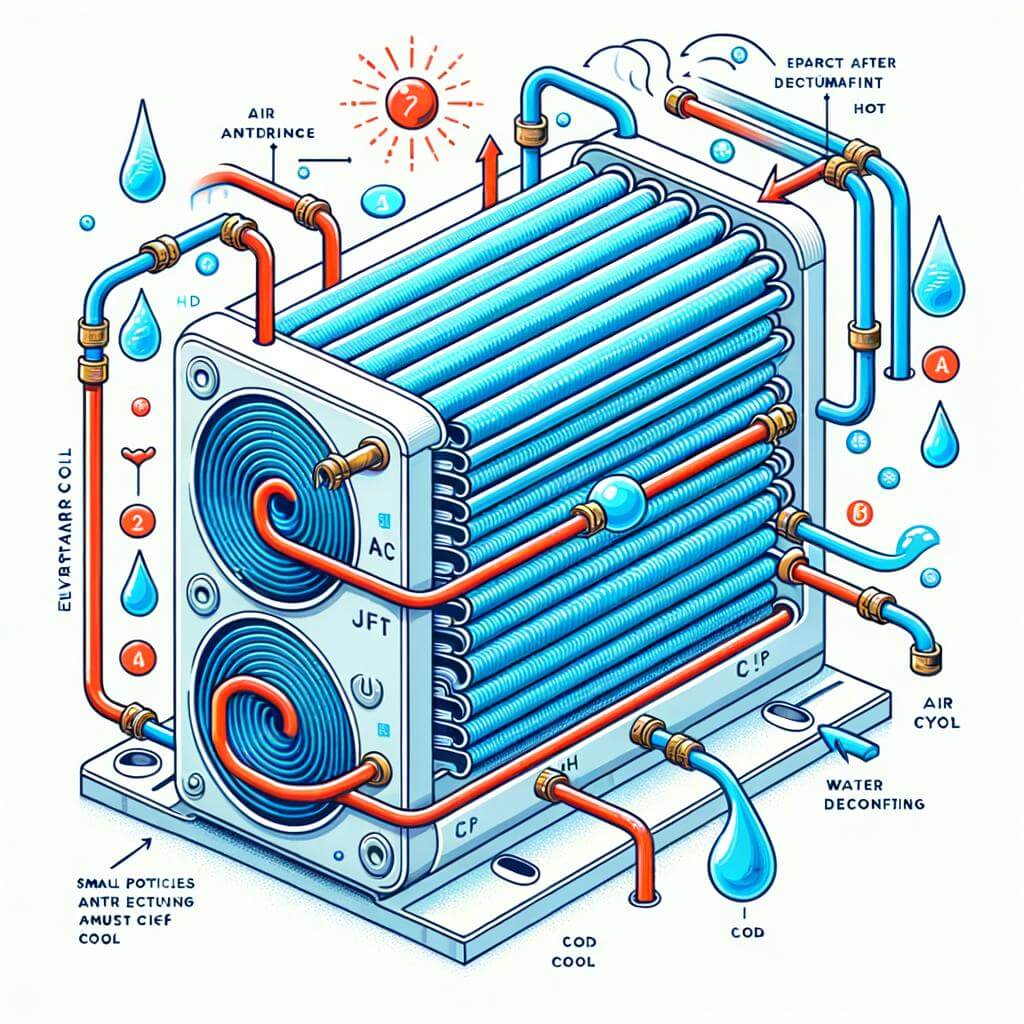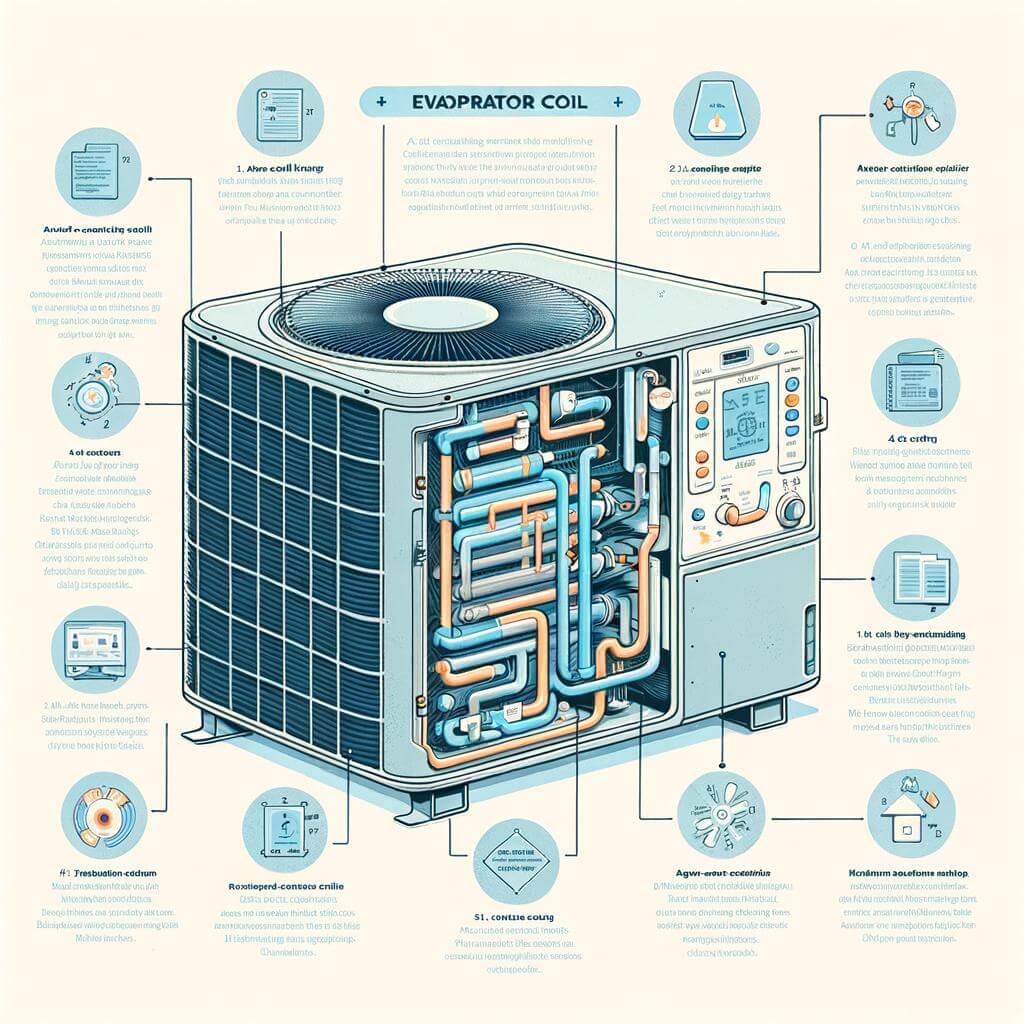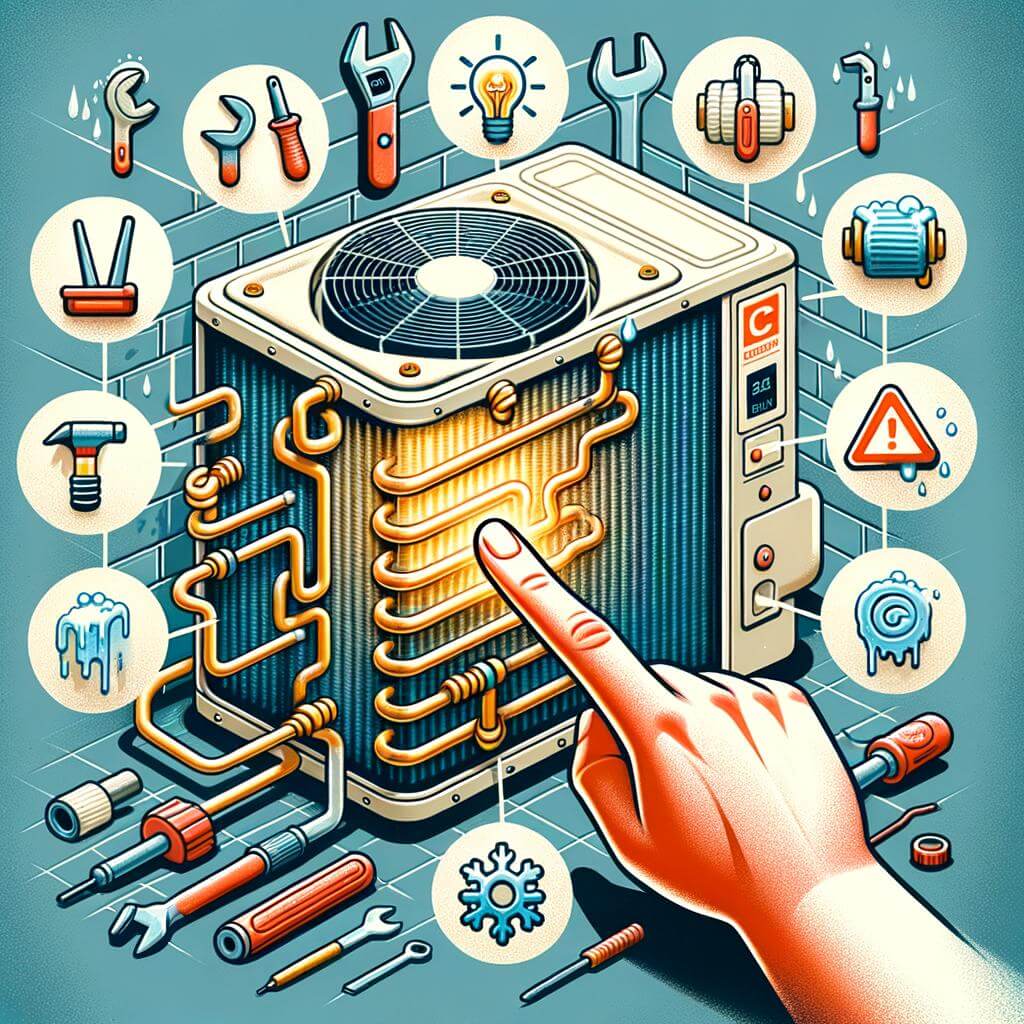Welcome! This educational post provides a detailed look into the essential role of the evaporator coil in your AC system. In recognizing its function, you can troubleshoot issues and maintain optimal efficiency, thus ensuring your unit performs at its best when you need it most. Leveraging expert opinion and fact-based information, this resourceful article aims to educate homeowners about this crucial component. If you’re looking to understand your air conditioning system better to enhance its performance or solve any arising issues, this post will certainly prove beneficial for you. It’s meant to be easily digestible, useful, and informative – exactly what you need to master your home’s cooling needs.
Introduction to the Evaporator Coil in Your AC System
Decoding the Mystery: Evaporator Coil
When it comes to home or office comfort, air conditioning systems are undoubtedly an integral aspect. They do a wonderful job of regulating the temperature and making our spaces habitable regardless of the season. However, most people are oblivious to the inner dynamics of how these systems function, more so the much underrated part, the evaporator coil.
So, let’s break it down. The evaporator coil hosts the chilled refrigerant that absorbs heat from its surrounding space. It’s the critical component that enables your air conditioning system to deliver cool, refreshing air. Essentially, their role is akin to the heart of your AC system, pumping life (in this case, cold air) into your environment. They are typically made of copper, steel, or aluminum for better heat transfer efficiency.
Here’s a quick outline of how these coils function:
- Absorbing heat from interior spaces using refrigerant
- Transfer the heat to the condenser coil
- The condenser coil subsequently dissipates the absorbed heat outside
- Meanwhile, the cooled air is pushed into your home, lowering the temperature.
| Coil Material | Heat Transfer Efficiency |
|---|---|
| Copper | High |
| Steel | Medium |
| Aluminum | High |
Understanding the evaporator coil can help you maintain your AC system better, thereby extending its lifespan, ensuring optimal performance and saving you money in the long run.

Understanding the Function of the Evaporator Coil
The evaporator coil, an integral component of an air conditioning system, functions primarily to absorb heat from the indoor air that passes over it. While the compressor and condenser majorly deal with the heat exchange from the outside surroundings, the evaporator coil works within the home to maintain the desired temperature. Its effectiveness depends on its size, material, and the amount of airflow it encounters, among other factors.
The process begins when the AC system pulls in warm air from inside your home. Coils that contain refrigerant fluids accomplish the heat absorption. These fluids stay at a very low temperature to absorb and subsequently dissipate excess heat from passing air. As the fluids evaporate, the warm indoor air is cooled and then distributed back into your home, hence the name ‘evaporator coil.’
| Components | Function |
|---|---|
| Refrigerant | Absorbs excess heat from indoor air |
| Coil | Allows efficient heat transfer with the refrigerant |
Essentially, the evaporator coil is the component which makes your indoor environment cool and comfortable, especially during scorching summer months. Keeping the evaporator coil clean is imperative since dirt and debris can restrict airflow and heat exchange, leading to reduced efficiency or even system failure. Therefore, timely inspection and maintenance can not only help in maximizing the performance of your AC unit but also in extending its lifespan.
- Cleaning: Regularly clean the coils to prevent build-up of dust and debris
- Maintenance: Schedule regular professional maintenance for optimal functionality
- Replacement: If damage occurs, replace the coil promptly to avoid more extensive system damage
By understanding the importance and the functionality of the evaporator coil in your AC system, you can ensure its optimum performance and durability, offering you a cool and comfortable space to live in.
Significance of the Evaporator Coil in Cooling Your Home
The evaporator coil is an integral part of your home’s air conditioning system, playing a critical role in the system’s ability to cool your home effectively. It’s located inside the indoor unit and functions to absorb heat from the air within your home. During this process, the coil is cooled by refrigerant, resulting in cooler air being circulated back into your home. The importance of this component can’t be overstated. Not only does it have a direct impact on the comfort levels within your house, but it also affects the overall energy efficiency of your AC system. Hence, understanding its role will help you in ensuring a more comfortable and energy-efficient home.
When the air conditioner is running, the evaporator coil gets extremely cold. When warm air from your home comes into contact with this coil, the heat in the air gets transferred to the coil, thereby cooling the air. This cooled air is then circulated back into your home. On the other hand, the refrigerant within the coil absorbs the heat and gets evaporated. This cycle repeats, ensuring a steady and effective cooling process. Nevertheless, its function is not without its challenges. For instance, if not properly maintained, it’s prone to freezing, resulting in a decline in cooling efficiency. Therefore, it’s essential to ensure regular maintenance of this component.
- Efficient Cooling: The evaporator coil absorbs the heat from your home’s air, thereby cooling it before it’s circulated back into your home.
- Energy Efficiency: A well-maintained evaporator coil ensures the smooth running of your air conditioning system ultimately leading to lower power consumption.
- Maintenance: In order to ensure its efficient functioning, the evaporator coil needs to be cleaned and maintained regularly.
Overall, the evaporator coil is a cornerstone in the functioning of your home’s AC system. It plays a crucial role in both the cooling of your home and the overall energy efficiency of your AC system.

Common Problems with the Evaporator Coil and How They Affect Your AC
Your AC system’s evaporator coil plays a pivotal role in cooling your home. The coil’s primary function is to absorb heat from the air inside your home and leave you with refreshing, cool air. However, the evaporator coil is not immune to problems, and common issues can significantly reduce your AC’s performance. These include freezing of the coil, dust and dirt buildup, and refrigerant leaks.
Freezing of the Coil: A frozen evaporator coil is a common problem in air handlers, ultimately leading to a system breakdown. This typically happens when there’s inadequate airflow, and the coil gets excessively cold and freezes. When your coil is frozen, the air cannot pass through efficiently, and you are likely to experience uneven cooling or no cooling at all.
Dust and Dirt Buildup: Dust and dirt accumulating on your evaporator coil can compromise your AC’s performance. The buildup insulates the coil and hinders its ability to absorb heat, leading to reduced cooling capabilities. If left uncleaned, over time, this may cause the coil to fail prematurely.
Refrigerant Leaks: If your AC system is low on refrigerant, chances are, there’s a leak somewhere. When there’s a refrigerant leak from the evaporator coil, your AC will start to lose its cooling capacity. Over time, this can result in a system breakdown.
As you can see, these issues are substantial and can significantly impact your AC’s cooling ability and efficiency. It’s essential to maintain your evaporator coil regularly to prevent these problems from occurring. If you notice any signs of these issues such as reduced cooling, increased electricity bills or unusual noises from your AC, it’s time to call a professional. They can diagnose the problem and get your AC functioning optimally, saving your time and money in the long run.
| Problem | Possible Effect on AC | Solution |
|---|---|---|
| Freezing of the Coil | Inadequate Cooling | Improved Airflow |
| Dust and Dirt Buildup | Reduced Cooling Capabilities | Regular Cleaning |
| Refrigerant Leaks | Loss of Cooling Capacity | Professional Repair |

Maintenance Tips and Recommendations for Your AC’s Evaporator Coil
An important component of your AC system is the evaporator coil. This is the part of your air conditioner that absorbs heat from your home’s air. And while it may seem like a small, insignificant part, the evaporator coil actually plays a significant role in your home’s cooling system. Therefore, it is vital to maintain this part effectively and keep it in good working order.
Ensuring proper air circulation around the evaporator coil is crucial. Blocked airflow can cause the coil to freeze, impairing the AC’s ability to cool your home. Be sure to regularly check your air filter and replace it if it’s dirty or clogged. This will not only improve your indoor air quality but also ensure the longevity of your evaporator coil.
- Clean the evaporator coil once a year. This prevents dust, dirt, and debris from building up and causing problems. A clean coil is more efficient, meaning your AC system will be able to cool your home more effectively.
- Get a professional inspection at least once a year. While there are some things you can do on your own, it is always beneficial to have a professional take a look. They will be able to identify any potential issues and address them before they become larger problems.
- Have the refrigerant level checked. Too much or too little refrigerant can adversely affect the operation of the evaporator coil. Regular checks can ensure the refrigerant level is optimal.
| Maintenance Task | Frequency |
|---|---|
| Clean Evaporator Coil | Once a year |
| Professional AC Inspection | Once a year |
| Check Refrigerant Level | Every Cooling Season |
In conclusion, regular maintenance of your AC’s evaporator coil can drastically improve the performance of your cooling system, lower energy bills, and extend the life of your Air conditioning unit. With these simple tips and recommendations, you can keep your AC functioning at its best.

When to Replace the Evaporator Coil in Your Air Conditioning System
Understanding Your AC System’s Lifespan
The lifespan of the evaporator coil in your air conditioning system can vary. Many factors influence the longevity of this essential component, including regular maintenance, environmental factors, and the quality of the original installation. In general, a well-maintained and properly installed air conditioning system should provide effective cooling for 10 to 15 years. However, an evaporator coil might need replacement sooner if it suffers damage or loses efficiency prematurely.
With proper care and regular maintenance, you can expect your evaporator coil to last as long as your AC system. However, issues such as inefficient cooling or leaking refrigerant could be tell-tale signs that your evaporator coil needs replacement. Here are some prominent indicators:
- Your AC system operates less efficiently.
- There is a noticeable reduction in cooling capacity.
- The refrigerant starts leaking.
- Unusual noises from the AC unit.
Seasonal Considerations for Coil Replacement
In addition to the aforementioned signs, you may want to consider the time of year. The best time to replace the evaporator coil in your air conditioning system is during the cooler months. This is because the demand for AC system services tends to decrease, so you may get a better deal. Moreover, this timing allows any kinks or issues related to the replacement to be worked out before the heavy usage season arrives.
If you face an emergent issue during high season, don’t hesitate to replace your evaporator coil. The longer you wait, the more potential damage your system could suffer. Always trust a professional service provider for the evaluation and replacement of your AC system’s parts.
| AC System Component | Expected Lifespan |
|---|---|
| Evaporator Coil | 10-15 Years |
| Compressor | 10-15 Years |
| Blower Motor | 10-20 Years |
In Summary
In conclusion, understanding the role of the evaporator coil in your AC system is essential in ensuring the efficiency and longevity of your unit. This key component is responsible for providing you with cool, comfortable air on hot summer days, making its status and health a top priority. With the information in this article, you not only understand how your AC system works, but also how to better maintain and troubleshoot it. Make it a routine to check the evaporator coil and seek professional assistance if necessary, to avoid unexpected expenses and inconveniences. True understanding of your AC system will enable you to take smarter, more informed decisions regarding its maintenance, repair, and operation. With this knowledge in your toolbelt, you can look forward to a cool, comfortable climate, no matter the heat outside.




